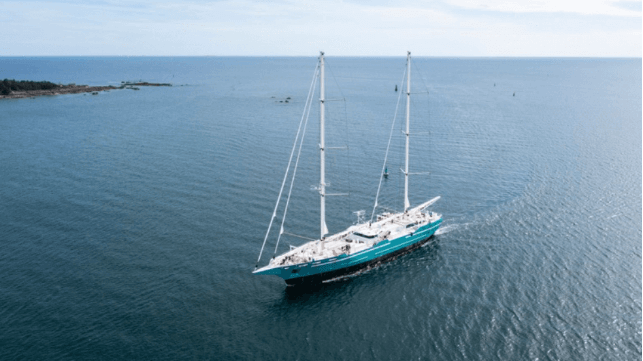“Anemos,” 1st Sailing Cargo Ship in Modern History About to Sail

[By: PIRIOU]
TransOceanic Wind Transport's (TOWT) first sailing cargo ship has just been delivered by PIRIOU Shipyard. Today she will set sail to Le Havre where she will moor alongside on Tuesday.
Loading operations will then take place before sailing by the end of next week. This state-of-the-art vessel will make her first voyage to New York City where she is expected around the 20th.
With this first delivery, TOWT is making merchant shipping history and pioneering the decarbonization of the global maritime sector.
"Today, our first sailing cargo vessel is actually becoming ours: what emotions! After over two years in the shipyard, we are taking delivery of this ship, as seven more are yet to join the fleet! Today our thoughts go to all our partners who have been with us from the beginning of this venture. Now time for operation has come: “Anemos” will soon set sail from Le Havre to New York for her first commercial voyage, a proper TransOceanic Wind Transport" states Diana MESA, TOWT Managing Director.
"In these Olympic hours, we have made the fight against global warming our discipline. Tomorrow's launch of the sailing cargo ship “Anemos” is nothing compared to what is at stake. However, this day brings hope: today, a shipbuilding industry is taking up the challenge of building large sailing cargo ships for customers who are willing to innovate and commit themselves to “do the job”. As shipowners, we sail with humility but with an ambitious mission: to decarbonize world shipping. Thank you to all who have worked to make this day possible” comments Guillaume Le Grand, TOWT CEO.
The world's largest sailing cargo ship: “Anemos”
“Anemos” is TOWT's first sailing cargo ship. After more than two years of construction, she was delivered to Concarneau by PIRIOU shipyard. This sailing cargo ship is unique in the world:
- 81 meters long, 15 meters wide, 63 meters high.
- Sailing technology derived from ocean racing and automated rigging, allowing to sail 100% under sail, with an autonomous routing system based on artificial intelligence and meteorological data.
- Wake energy recovery technology using dynamos and variable pitch propellers.
Vincent Faujour, President of PIRIOU group declares: “ANEMOS’ delivery today in Concarneau marks a key milestone in our partnership with TOWT. Far from an end, we are writing the beginning of a great story. First sailing cargo vessel of its kind, ANEMOS will be followed by 7 sister-ships, constituting the world’s first decarbonized fleet. ANEMOS is a concentrate of French innovations. It is the result of the audacity of a shipowner but also of a shipbuilder with its partners. I would really like to thank all our teams, from design to production, who worked hard to make this ship possible. They have shown a remarkable commitment. Finally, I would like to thank Diana and Guillaume for their trust in PIRIOU and the French shipbuilding industry. Fair winds to ANEMOS and her crew!"
First of a fleet
PIRIOU performed all the basic design of the ship as well as all the R&D in France. The construction was then launched at the Romanian shipyard of PIRIOU, before being outfitted and commissioned in Concarneau, France.
The build of Sailing Vessel “Anemos”, the first sistership in TOWT's eight-ship fleet, is the result of the best efforts of several leading French manufacturers. PIRIOU of course, including in its engineering and construction dimensions, but also H&T the architect, Incidence Sails, LORIMA and the Wichard Group, Actemium Marine, Paumier Marine, ACEMS... numerous stakeholders have joined forces to put this unique vessel on the water.
Ecology through concrete action: real decarbonization
By harnessing the power of the wind to shape low-carbon maritime logistics, sailing offers new prospects for economic development and innovation. Wind is a reliable offshore resource, inexhaustible, abundant and predictable.
Sailing as the primary mode of propulsion makes ocean transportation massively less polluting. In comparison with the average for container ships on the same transatlantic Westbound route, SV ANEMOS will massively reduce greenhouse gas emissions, as per ton transported and per kilometer travelled:
- At least -93% CO2, up to more than -99%.
- 98% Sulphur oxides; - 97% nitrogen oxides; 0 methane emission.
In addition to positive impact on climate the use of a sailing cargo vessel, instead of an engine reduces the impact on biodiversity with less risk of collision (noise) and less ocean acidification.
The carbon footprint of the sailing cargo vessel is less than 2g/km/T transported for a transatlantic route (calculations validated by the ADEME Agency). By 2025, TOWT will have saved 9,600 tons of CO2 emissions per year to and from Le Havre and will have shifted 72,000 tons of cargo per year to low carbon transport.
The products and services herein described in this press release are not endorsed by The Maritime Executive.

